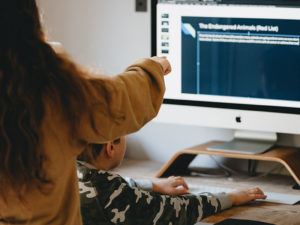Families and Remote Learning
Almost overnight, over 95% of American families had to develop and support new practices for learning at home as school districts scrambled to meet the academic, social and emotional needs of their communities. Emergency school closures have exposed significant gaps in access to the Internet and devices, and the capacity of parents/caregivers and communities to capitalize on technology to sustain health-relevant learning in a time of crisis. This project is collecting data to develop a deeper understanding of how families adapt to these changes – the troubles they encounter, and the solutions they generate. Insights will be used to strengthen preparedness for the future – with an equity approach to solution development.
The research project “Using remote diary methods to understand how families navigate emergency-driven homeschooling driven by COVID-19” is documenting how families engage in creative practices to generate powerful learning based on local needs, values, contexts, and histories in this present crisis: (1) What resources are schools providing and how are parents navigating and extending these resources to sustain their child’s learning? (2) What barriers and challenges do parents and students face in using school-provided resources? (3) How are families learning about the science of virus transmission and prevention to protect themselves during the pandemic?
Because of the broader mandate for social distancing and restrictions on in-person human subjects research, this project is using a remote mobile-phone-enabled diary method tool to reach families across the country. This study and a corresponding virtual workshop with other researchers will help establish a broader research agenda to specify the conditions under which socio-technical systems productively augment a family’s collective capacity to innovate and learn when traditional co-located school settings disappear. It will also contribute new knowledge about human learning under conditions of duress and identify unexpected social and emotional outcomes that may emerge as a result of the crisis. Insights will set the stage for advances in remote data collection approaches, new tools for data analysis, and innovation in research designs.
Primary Investigator: Brigid Barron (Stanford Graduate School of Education)
Sponsored by: NSF
Dates: 5/1/20 – 4/30/21



